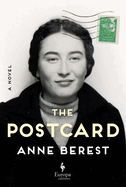
"They don't like Jews very much at school," a six-year-old French girl tells her grandmother, Anne Berest's mother, halfway through The Postcard, Berest's brilliant work of autofiction, translated from the French by Tina Kover. Her daughter's experience is only the latest indignity endured by Berest's Jewish family. On a snowy day in 2003, Anne's mother, Lélia, receives a mysterious postcard in the mail. Written on the card in an unfamiliar script are the names of four of Lélia's relatives: maternal grandparents Ephraïm and Emma, and two of their children, Noémie and Jacques. All four were killed at Auschwitz in 1942. Among the mysteries pertaining to this card: Who sent it? For what purpose? Why is the postage stamp upside down? And why does the card appear to have been purchased 10 years before it was mailed?
Berest (Sagan, Paris 1954) paid no heed to the card when her mother received it. Sixteen years later, after her daughter's encounter at school, Berest becomes obsessed with finding out who sent the card and learning about her family history. The bulk of The Postcard involves Berest's inquiries and the painful family stories she uncovers. The book derives enormous power from seemingly small details, including the number on the door behind which concentration-camp prisoners are held, and Ephraïm continuing to set the dinner table for four after, "with plates and silverware for Noémie and Jacques, as he had done every day since their arrest." This is a gut-wrenching, exceptional work. --Michael Magras, freelance book reviewer

